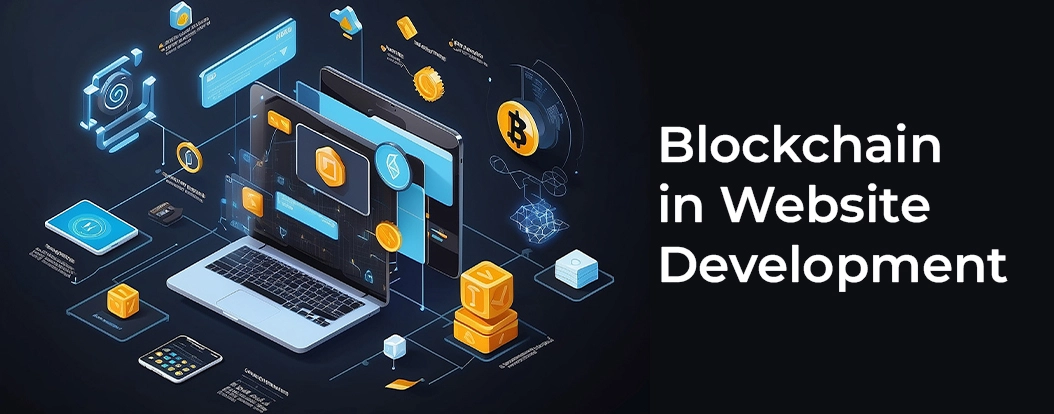
Impact of Blockchain in Web Development
Blockchain is set to revolutionise website development by bringing unmatched levels of security, transparency, and efficiency. In our latest blog, "Impact of Blockchain in Web Development," we explore how blockchain technology is creating a new era of web applications. Discover its impact on various sectors, the challenges, and best practices for integrating blockchain into your web projects. Ideal for developers and business leaders looking to stay ahead in the digital world.
What is Blockchain?
A Blockchain is a secure digital record stored on a network of computers without a central authority. Its unchangeable nature makes it perfect for industries that need reliable data, like finance, supply chain management, and legal contracts.
How Blockchain Benefits Web Development?
Get ready for a web revolution with blockchain! This exciting tech offers a whole range of benefits, like making websites more secure and private, and helping to create new and more efficient ways of doing things. As blockchain becomes easier to use, we can expect to see it popping up in more and more web projects. This could well change the way we design, build and use websites in the future! Let’s discuss some of the key benefits of blockchain web development below:
Security:
Blockchain’s decentralized and cryptographic nature enhances web application security against hacks and fraud.
Transparency:
Blockchain ensures all transactions are visible and verifiable, building user trust and confidence.
Decentralization:
Blockchain removes the need for central authorities, allowing efficient peer-to-peer interactions and lowering costs.
Cost Reduction:
Blockchain reduces transaction fees and other costs by streamlining processes and removing intermediaries.
Speed:
Blockchain processes transactions faster than traditional banking systems, crucial for real-time web applications.
Smart Contracts:
Smart contracts automate agreements, eliminating the need for intermediaries and accelerating processes.
Privacy:
Blockchain gives users control over their personal data, enhancing privacy and security in web applications.
Data Quality:
Blockchain ensures that data remains complete, reliable, timely, accurate, and accessible for thorough analysis and decision-making.
Innovation:
Blockchain integration enables the development of decentralized applications (DApps) and new business models.
Enhancing Security with Blockchain Technology in Web Development
Decentralization:
Traditional web applications store data on centralized servers, making them prime targets for hackers. Blockchain decentralizes data across a network of computers, reducing the risk of data breaches.
Immutability:
Once data is recorded on a blockchain, it cannot be changed or erased. This ensures the integrity of the application’s data, making it secure against unauthorized modifications.
Cryptography:
Blockchain uses advanced cryptography to secure data transactions, ensuring both confidentiality and authenticity.
Transparency and Verifiability:
Blockchain’s transparency allows all transactions to be visible and verifiable, fostering trust among users and facilitating the detection of suspicious activities.
User Privacy and Control:
Blockchain technology provides users with more control over their personal information, enhancing privacy and security.
Resilience to DDoS Attacks:
Decentralized applications (DApps) on blockchain are less prone to Distributed Denial of Service (DDoS) attacks because their distributed structure disperses network traffic.
Secure Identity Verification:
Blockchain offers a secure method for identity verification, reducing risks associated with centralized identity management systems.
Ensuring Data Integrity:
Blockchain technology inherently maintains data integrity, providing a reliable foundation for secure web applications.
Minimizing Third-party Risks:
Blockchain reduces security risks associated with third-party services by enabling peer-to-peer transactions without intermediaries.
Best Practices for Integrating Blockchain into Web Development to Enhance Security
- Understand what you need it for
- Pick the right blockchain platform
- Make strong smart contracts
- Focus on privacy and protecting data
- Keep the blockchain network secure
- Use encryption properly
- Do regular security checks
- Set up access controls
- Plan for growth and future needs
- Stay updated with the latest trends and adapt
Wrap Up: Blockchain and Web Development
Integrating blockchain into web development greatly improves security, transparency, and efficiency. Its features like decentralization, immutability, and cryptographic security solve major challenges, enabling trustless environments and secure systems. Despite issues like scalability and regulation, blockchain has the potential to revolutionize web development and create innovative applications. Remaining updated and adhering to recommended practices is crucial. As blockchain evolves, it will redefine web development, offering exciting opportunities for developers and businesses.
Thanks for taking your precious time to read this blog and I hope you all like it!
We Open New Doors To Your Business
